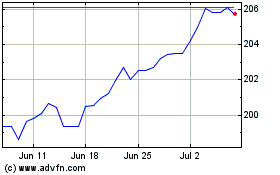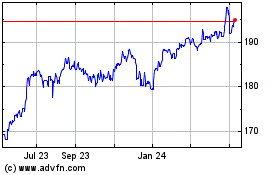RBA Leaves Interest Rate Unchanged At Record Low
December 03 2018 - 7:44PM
RTTF2
The Reserve Bank of Australia on Tuesday decided to keep its
benchmark interest rate unchanged at a record low, citing sluggish
wage growth and low inflation.
The board of the Reserve Bank of Australia, governed by Philip
Lowe, voted to maintain the cash rate at 1.50 percent. The interest
rate has remained at the current level since August 2016.
"Taking account of the available information, the Board judged
that holding the stance of monetary policy unchanged at this
meeting would be consistent with sustainable growth in the economy
and achieving the inflation target over time," the bank said in a
statement.
Policymakers observed that the low level of interest rates is
continuing to support the Australian economy.
They expect further progress in the reduction of unemployment
and inflation returning to target, but this progress is likely to
be gradual.
The Australian economy is performing well with the GDP growth
expected to average around 3.5 percent for this year and next, the
bank said.
Inflation is forecast to pick up in the coming years, but the
acceleration is likely to be gradual. The central scenario is for
inflation to be 2.25 percent in 2019 and a bit higher in the
following year.
Labor market remained strong with the unemployment rate
declining to 5 percent over the past year, the RBA noted. As the
economy is expected to continue to grow above trend, a further
reduction in the unemployment rate is likely, the bank added.
Concerning the property market, the RBA said conditions in the
Sydney and Melbourne housing markets have continued to ease and
nationwide measures of rent inflation remain low.
The outlook for household consumption remained a source of
uncertainty for the economy, the bank cautioned. Growth in
household income remains low, debt levels are high and some asset
prices have declined.
Growth in credit extended to owner-occupiers has eased, while
the demand by investors has slowed noticeably due to changing
dynamics of the housing market, it added.
The RBA statement sounded a little cautious by assessing
external conditions to be less favorable, Marcel Thieliant, an
economist at Capital Economics, said.
Thieliant suggested that the bank seemed to be getting a bit
more worried about the downturn in the housing market.
Given the dovish outlook for the economy and prices, the
economist said that rates are unlikely to rise until late in
2020.
Sterling vs Yen (FX:GBPJPY)
Forex Chart
From Mar 2024 to Apr 2024

Sterling vs Yen (FX:GBPJPY)
Forex Chart
From Apr 2023 to Apr 2024
